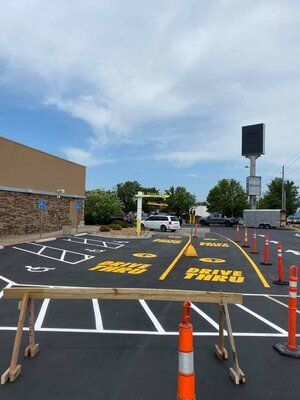Creating a beautiful and functional asphalt driveway isn’t just about the initial installation; it’s about ongoing maintenance. If you want your new asphalt driveway to stand the test of time, you must adopt effective maintenance strategies. In this article, we will delve into various tips and techniques for maintaining a smooth surface on your new asphalt driveway. From understanding the costs involved with asphalt paving to knowing when to sealcoat or repair your driveway, we've got you covered.
Understanding Asphalt Driveway Installation
What is an Asphalt Driveway?
An asphalt driveway is a durable and cost-effective option for both residential and commercial properties. Unlike concrete, which can be prone to cracking, asphalt offers flexibility that allows it to withstand temperature changes without significant damage.
The Process of Asphalt Driveway Installation
The installation process involves several steps:
Excavation: Removing existing materials. Grading: Ensuring proper drainage. Base Layer: Laying down a base of gravel. Asphalt Paving: Applying hot mix asphalt paving. Compaction: Compacting the asphalt for durability.Cost of Installing an Asphalt Driveway
When considering an asphalt driveway, one must factor in various costs:
- Material Costs: The price per ton of hot mix asphalt can vary. Labor Costs: Hiring professional asphalt paving contractors can affect your budget. Additional Services: Sealcoating and maintenance services will add to the overall cost.
Initial Care After Installation
Waiting Period After Installation
After installing your new asphalt driveway, it's crucial to allow it to cure properly. Typically, this takes about 24-48 hours before driving on it.
Weight Restrictions During Curing Period
Avoid parking heavy vehicles on the driveway during the curing process to prevent deformation.
Avoiding Water Accumulation
Ensure good drainage by directing water away from the freshly laid surface using proper grading techniques.
Regular Maintenance Practices
Routine Inspections
Regular inspections can help identify potential problems early:
- Look for cracks or holes that may worsen over time. Check for pooling water or areas where drainage seems poor.
Asphalt Crack Sealing Techniques
Crack sealing is vital in preventing larger issues:
Clean out debris from cracks. Use a quality crack sealant, following manufacturer instructions.Asphalt Patching Methods
If your driveway has significant damage, patching might be necessary:
Remove damaged sections. Fill with fresh hot mix asphalt. Compact thoroughly for best results.
Sealcoating Your Asphalt Driveway
Why Sealcoat?
Sealcoating protects your driveway from UV rays, moisture, and chemicals that can cause deterioration over time.

Best Time of Year for Sealcoating
The ideal time is during warm weather; temperatures should be between 50°F and 90°F for optimal application.
DIY vs Professional Sealcoating Services
Consider whether asphalt sealcoating you'll do it yourself or hire professionals:
- DIY can save money but requires skill and time. Professionals ensure quality work but at a higher cost.
Frequency of Maintenance Tasks
How Often Should You Sealcoat?
For high-traffic areas, consider sealcoating every 1-3 years; otherwise, every 3-5 years may suffice.
When Should You Repair Cracks?
Address cracks immediately after noticing them—delaying repairs may lead to larger issues requiring extensive repair work.
Dealing with Common Problems
Identifying Drainage Issues
Poor drainage can lead to numerous problems like cracking or pooling water:
Check slopes and grades around your driveway. Consider installing drainage solutions if needed.Options for Asphalt Edging
Edging enhances aesthetics while providing structural support:
- Concrete curbing Natural stone borders Timber borders
Protecting Against Weather Elements
Winter Maintenance Tips
Snow removal should be done with care:
Use plastic shovels instead of metal ones that could scratch the surface. Avoid using salt; opt for sand instead as it won’t damage the pavement.Summer Heat Considerations
In hot weather, avoid parking heavy vehicles on newly sealed surfaces as they can leave marks or depressions.
Long-Term Strategies for Maintenance Success
Educate Yourself About Your Driveway
Knowledge is power! Understanding how different factors affect maintenance helps prolong its lifespan significantly.
Choosing Quality Materials
Invest in high-quality materials during installation and repairs; cheaper options often lead to more frequent repairs down the line.
FAQs
Q1: How long does an asphalt driveway typically last?
A: With proper maintenance, an asphalt driveway can last between 15 to 30 years depending on usage and environmental conditions.
Q2: What’s included in regular maintenance?
A: Regular maintenance includes inspecting for cracks, sealcoating every few years, and ensuring proper drainage around the area.
Q3: Can I pave over my old concrete driveway?
A: Yes, many companies offer services that allow you to pave over existing concrete if it's in good condition without major cracks or damage.
Q4: How do I know if my driveway needs resurfacing?
A: If there are extensive cracks throughout or if you're experiencing significant water pooling issues, it's likely time for resurfacing rather than patching alone.
Q5: Is sealcoating really necessary?
A: Yes! Sealcoating protects against UV rays and weather elements that could deteriorate your asphalt faster than expected without protection.
Q6: What is ADA-compliant parking lot striping?
A: ADA-compliant parking lot asphalt paving striping ensures accessibility standards are met for individuals with disabilities according to federal regulations.
Conclusion
Maintaining a smooth surface on your new asphalt driveway requires ongoing attention and care—but it pays off in longevity and aesthetics! By following these tips—from understanding installation processes to regular inspections—you’re well-equipped to keep your investment looking great year after year. Don’t hesitate! Start implementing these tips today so you can enjoy your beautiful new asphalt driveway tomorrow!